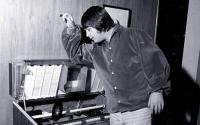10 February 2007Robert Kuttner
I have never seen a stronger field of Democratic presidential candidates, nor a weaker Republican one. Yet, as a Red Sox fan, I am always wary of this-could-be-the-year fever.
I was thinking about the Democrats as I watched a new, compelling and even-handed film about the odyssey of Ralph Nader. The independent movie, "An Unreasonable Man," opened yesterday at the Coolidge Corner Theatre .
The movie begins with assorted liberals making enraged, scathing comments. "Outside of Jerry Falwell, no one in the world is on a bigger ego trip," says James Carville. "Thank you, Ralph, for the Iraq War," says Nation magazine columnist Eric Alterman, "Thank you for the destruction of the Constitution."
Former talk show host Phil Donahue adds, with deep regret, that Nader's role in the 2000 election "is going to be the first line of his obituary." But the makers of this superb movie, while giving plenty of air-time to Nader's many critics, set out to make sure that doesn't happen.
For people younger than I, it's too easy to forget who Ralph Nader was -- and still is. As a lawyer not yet 30 years old, Nader began writing about a subject that literally did not exist as a public issue until he invented it -- cars that were dangerous by design. Detroit had popularized a one-liner that the leading cause of accidents was "the nut behind the wheel." By definition, death and disfiguring injury had be to the driver's fault, not the automakers'.
When Nader exposed the systematic dangers in Detroit's cars, first in magazine articles, then in his 1965 book, "Unsafe at Any Speed," General Motors Inc. put detectives on his tail, tried to set him up with women, investigated whether he might be gay or smoked pot, pretended to be conducting job reference interviews.
An incensed Senator Abe Ribicoff called GM President James Roche to testify. Roche defended GM's "legal right to ascertain the facts." Ribicoff shot back that Nader's sex life had nothing to do with his criticisms of GM's cars. Roche huddled with his lawyers, apologized to the committee and to Nader, and later settled an invasion of privacy lawsuit. The proceeds, deliciously, went to underwrite the Center for Responsive Law, soon made famous as Nader's Raiders.
The David vs. Goliath saga, deftly shown in the film, put Nader and auto safety on the map. Just two months after the Ribicoff hearings, Lyndon Johnson signed the nation's first auto safety bill.
In the aftermath of Nader's abortive presidential runs, it's easy to forget all that he accomplished. It's also easy to forget that Nader was a relative conservative in an era of radicals. He and his raiders were the clean-scrubbed idealists determined to make the system work. Seat belts alone, according to government statistics, saved 195,382 lives over 30 years.
One by one, dozens of landmark pieces of consumer legislation resulted from Nader's efforts. "An Unreasonable Man" preserves that remarkable record, in entertaining and witty fashion.
Nader's leadership of that reform era, in which public interest legislation restrained the excesses of capitalism, lasted barely a decade. By the late 1970s, organized business had gathered its latent political influence and mounted a fierce counter offensive. With the exception of the occasional environmental bill, little more consumer legislation would pass Congress.
Nader watched for two decades as his and the public's handiwork was undone, with many Democrats serving as corporate enablers along with the Republicans. This frustration, in the end, led him to run for president, also recounted in the movie, warts and all.
I wish he hadn't. Or, if he had to run, Nader could have run in the Democratic primaries, where they could not have kept him out of the debates. He would have energized the progressive base, inspired independents, and forced Al Gore to speak with a more populist voice.
But it's not so clear that Nader cost Gore the 2000 election. Because if Nader hadn't run at all, Gore might have been even worse.
At one point in that campaign, when Nader was accused of risking a George W. Bush presidency, he replied with a cavalier phrase that sounded as if he was running as a spoiler -- that maybe the Democrats needed "a cold shower for at least four years."
Now, Democrats seem to be emerging from their wilderness, tougher and smarter. That's not to Nader's credit, but not exactly to his blame, either. See the film, and you'll appreciate more about the blockage of reform in America, and this complex and still valuable public citizen.
Robert Kuttner is co-editor of The American Prospect and a senior fellow at Demos. His column appears regularly in the Globe.
http://www.boston.com/news/globe/editorial_opinion/oped/articles/2007/02/10/deconstructing_nader/






